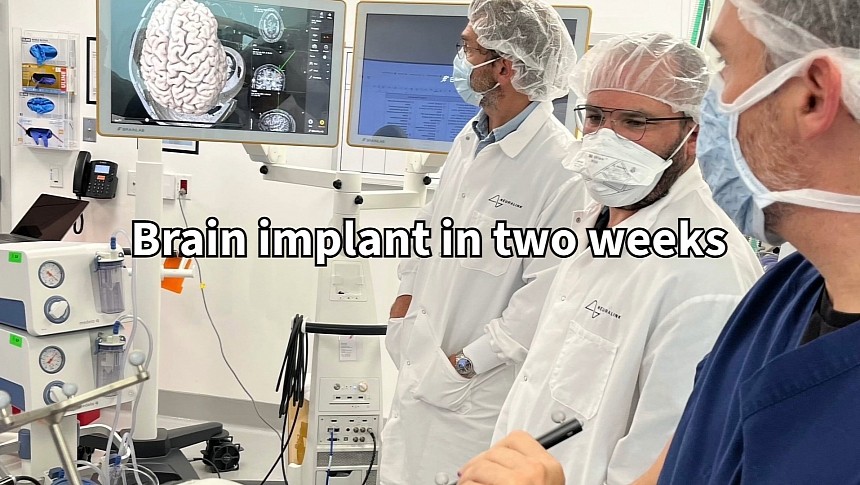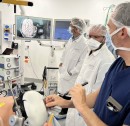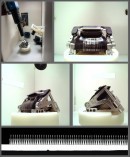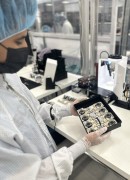In May, Elon Musk's Neuralink received FDA approval to start human trials for its brain implant. Four months later, Neuralink announced that it officially opened the application list for those who want a brain implant. If successful, the trial will allow human patients with paralysis to control external devices using their thoughts.
Neuralink is one of the most intriguing companies Elon Musk founded, with the ultimate goal to turn humans into cyborgs. Until then, the startup must prove that its brain implants work reliably and don't endanger the patients' lives during insertion, extraction, and everything in between. Neuralink will not be creating Robocops anytime soon, but the short-term goal is to enable people with paralysis to control external devices such as computer cursors or keyboards. Although not all lived to tell the story, the company has already demonstrated this capability with monkeys.
The start of human trials has been announced on the company's website. Neuralink is now receiving applications from those who want to volunteer for the first tests. Not everyone can apply, but the startup announced that people with quadriplegia due to cervical spinal cord injury or amyotrophic lateral sclerosis (ALS) may qualify. The next move will be the beginning of the first PRIME study (short for Precise Robotically Implanted Brain-Computer Interface) to evaluate the safety of the implant and surgical robot used during the procedure.
During the study, the R1 robot will surgically place the N1 Implant's ultra-fine and flexible threads in a brain region that controls movement intention. Neuralink says the implant will be cosmetically invisible once the procedure is complete and will allow capturing and transmitting brain signals to an app that decodes movement intention. Similar to animal trials, the goal is to enable people to control a computer cursor or keyboard using their thoughts alone.
We don't know how many people signed up for the study, but Elon Musk confirmed on X that the first patient will soon receive a Neuralink device. Musk also says that Neuralink's efforts can potentially restore full-body movement for incapacitated people. He gives Stephen Hawkings as an example. In the long term, Musk is confident Neuralink will "play a role in AI civilizational risk reduction by improving human to AI (and human to human) bandwidth by several orders of magnitude."
Neuralink's N1 brain implant is the size of a coin and is fitted with electrode-laced threads that connect with brain synapses. The company designed the R1 robot to perform the surgical procedure with utmost precision, avoiding damage to the brain tissue. Things didn't go exactly as planned with all the monkeys used in the animal trial phase. Some have died as a result of post-implant complications.
Musk first acknowledged the deaths of the macaques on September 10 in a reply to a user on X (formerly Tweeter). Nevertheless, he denied that the Neuralink implant caused any of the deaths. Musk said that researchers specifically selected animal subjects already "close to death," to minimize risk to healthy monkeys.
The start of human trials has been announced on the company's website. Neuralink is now receiving applications from those who want to volunteer for the first tests. Not everyone can apply, but the startup announced that people with quadriplegia due to cervical spinal cord injury or amyotrophic lateral sclerosis (ALS) may qualify. The next move will be the beginning of the first PRIME study (short for Precise Robotically Implanted Brain-Computer Interface) to evaluate the safety of the implant and surgical robot used during the procedure.
During the study, the R1 robot will surgically place the N1 Implant's ultra-fine and flexible threads in a brain region that controls movement intention. Neuralink says the implant will be cosmetically invisible once the procedure is complete and will allow capturing and transmitting brain signals to an app that decodes movement intention. Similar to animal trials, the goal is to enable people to control a computer cursor or keyboard using their thoughts alone.
We don't know how many people signed up for the study, but Elon Musk confirmed on X that the first patient will soon receive a Neuralink device. Musk also says that Neuralink's efforts can potentially restore full-body movement for incapacitated people. He gives Stephen Hawkings as an example. In the long term, Musk is confident Neuralink will "play a role in AI civilizational risk reduction by improving human to AI (and human to human) bandwidth by several orders of magnitude."
Neuralink's N1 brain implant is the size of a coin and is fitted with electrode-laced threads that connect with brain synapses. The company designed the R1 robot to perform the surgical procedure with utmost precision, avoiding damage to the brain tissue. Things didn't go exactly as planned with all the monkeys used in the animal trial phase. Some have died as a result of post-implant complications.
Musk first acknowledged the deaths of the macaques on September 10 in a reply to a user on X (formerly Tweeter). Nevertheless, he denied that the Neuralink implant caused any of the deaths. Musk said that researchers specifically selected animal subjects already "close to death," to minimize risk to healthy monkeys.
The first human patient will soon receive a Neuralink device. This ultimately has the potential to restore full body movement.
— Elon Musk (@elonmusk) September 20, 2023
In the long term, Neuralink hopes to play a role in AI risk civilizational risk reduction by improving human to AI (and human to human) bandwidth by… https://t.co/DzqoYI27Ng










